#Textile Processing
Explore tagged Tumblr posts
Text
Top Benefits of Using a Bowl Mangle Drying Range in Textile Industry

Boost textile processing efficiency with KEW Engg. & Mfg. Pvt. Ltd.'s Bowl Mangle Drying Range! 🌟 Achieve uniform fabric drying, energy savings & top-quality finishing. 🔹 Contact us now!
#kewengg#machinemanufacture#industrial#machinery#machine#manufacturer#exporter#supplier#Bowl Mangle Drying Range#textile processing#textile processing machinery
2 notes
·
View notes
Text
Oscar de la Renta: 'Crafted like a mosaic, discover the making-of the #odlrfall2024 stained glass gown — ushering in a a new House-signature embroidery technique.'

Constructed from hundreds of polyamide panes, hand-sewn together in an Art Nouveau style reminiscent of Tiffany glass. Ready-to-wear: £36,546.


#oscar de la renta#fashion#savoir faire#metiers d'art#video#process video#fall 2024#stained glass#couture embroidery#construction#atelier#2024#pattern#surface pattern#surface pattern design#pattern design#textile design#textiles#wisteria#flowers#floral#polyamide#plastic#art nouveau#tiffany glass#louis comfort tiffany#art history#design history
32K notes
·
View notes
Text
Dress for Success: Sustainable Fashion Tips for the Modern Workforce with Sri Shakthi Tex

In today’s dynamic and eco-conscious world, dressing for the office isn’t just about looking professional — it’s also about making ethical and sustainable choices. Sri Shakthi Tex, a leading manufacturer of quality textiles in Erode, offers a stunning range of natural fabrics that are perfect for creating chic and comfortable workwear ensembles.
So, ditch the bland, synthetic suits and embrace the power of conscious fashion! Here are some sustainable style tips to help you achieve a polished and professional look while feeling confident and comfortable all day long:
1. Embrace the Versatility of Natural Fabrics:
Sri Shakthi Tex offers a treasure trove of breathable and eco-friendly fabrics like organic cotton, linen, and rayon. These natural fibers not only drape beautifully but also keep you cool and comfortable throughout the workday.
2. Play with Prints and Patterns:
Subtle prints and textures can add visual interest to your outfit without compromising professionalism. Sri Shakthi Tex boasts a collection of exquisite prints inspired by nature and Indian heritage, perfect for making a statement without going overboard.
3. Invest in Classic Staples:
Build your workwear wardrobe with versatile pieces that can be easily mixed and matched. A crisp white shirt, a well-fitted blazer, and tailored trousers from Sri Shakthi Tex can be adapted to create countless professional looks.
4. Accessorize Wisely:
The right accessories can elevate your outfit and add a touch of personality. Opt for simple yet elegant jewelry, a statement scarf, or a sleek leather bag for a polished finish.
5. Comfort is Key:
Remember, you’ll be sitting and moving around throughout the day, so prioritizing comfort is essential. Choose pieces that allow for freedom of movement without compromising on style. Sri Shakthi Tex’s natural fabrics are naturally soft and breathable, ensuring you stay comfortable all day long.
6. Embrace the Ethical Choice:
By choosing sustainable fabrics from Sri Shakthi Tex, you’re not just making a statement about your personal style, you’re also contributing to a healthier planet and fairer working conditions for textile workers. Sri Shakthi Tex is committed to ethical production practices and sustainable sourcing, making them the perfect choice for the conscious consumer.
Conclusion:
Dressing for success in the modern workplace doesn’t have to be boring or unsustainable. With Sri Shakthi Tex’s quality textiles in erode and these styling tips, you can create a professional and polished look that reflects your commitment to both style and sustainability. So step into the office feeling confident and empowered, knowing that you’re making a positive impact on the planet one outfit at a time.
#Textile Manufacturing#Fabric Production#Textile Industry#Quality Fabrics#Yarn Manufacturing#Weaving Services#Knitting Solutions#Fabric Export#Sustainable Textiles#Textile Innovation#Textile Products#Yarn Suppliers#Dyeing and Finishing#Textile Processing#Apparel Fabrics
0 notes
Text
Beginner
Intermediate
Advanced
Self-taught one work-in-progress at a time so that there’s some beginner stuff I don’t know and advanced stuff that I do know and I will forever be making silly beginner mistakes in complex projects that I’ll probably never complete :)
#only to add to the Bin Of Half Realized Dreams aka endless wips 😭#crochet#needlework#textile arts#craftblr#audhd problems#knitting#crocheting#granny square#granny squares#art wip#current wip#crochet wip#creative process#hyperfixation#adhd life#adhd artist#works in progress#work in progress
2K notes
·
View notes
Note
how do you come up with the ways cultures in your setting stylize people/animals/the world in general in their artwork, i.e. jewlery, rock carvings, statues, etc? Each culture in your world seems to have a very unique "art style" and I love it a lot - makes them seem that much more 'real'. This is something I struggle with a lot in my own worldbuilding and I'd love to pick your brain if possible 😁
I think a starting point is to have a research process based in the material realities of the culture you're designing for. Ask yourself questions like:
Where do they live? What's the climate/ecosystem(s) they are based in? What geographic features are present/absent?
What is their main subsistence method? (hunter gatherer, seasonal pastoralist, nomadic pastoralist, settled agriculturalist, a mix, etc)
What access to broader trade networks do they have and to whom? Are there foreign materials that will be easily accessible in trade and common in use, or valuable trade materials used sparingly in limited capacities?
Etc
And then do some research based on the answers, in order to get a sense of what materials they would have routine access to (ie dyes, metal, textiles, etc) and other possible variables that would shape how the art is made and what it's used for. This is just a foundational step and won't likely play much into designing a Style.
If you narrow these questions down very specifically, (ie in the context of the Korya post- grassland based mounted nomads, pastoralist and hunter-gatherer subsistence, access to wider trade networks and metals), you can direct your research to specific real world instances that fit this general idea. This is not to lift culturally specific concepts from the real world and slap them into your own setting, but to notice commonalities this lifestyle enforces - (ie in the previous example- mounted nomadic peoples are highly mobile and need to easily carry their wealth (often on clothing and tack) therefore small, elaborate decorative artwork that can easily be carried from place to place is a very likely feature)
For the details of the art itself, I come up with loose 'style guides' (usually just in my head) and go from there.
Here's some example questions for forming a style (some are more baseline than others)
Are geometric patterns favored? Organic patterns? Representative patterns (flowers, animals, stars, etc)? Abstract patterns?
Is there favored material(s)? Beads, bone, clay, metals, stones, etc.
When depicting people/animals, is realism favored? Heavy stylization? The emotional impression of an animal? Are key features accentuated?
How perspective typically executed? Does art attempt to capture 3d depth? Does it favor showing the whole body in 2 dimensions (ie much of Ancient Egyptian art, with the body shown in a mix of profile and forward facing perspective so all key attributes are shown)? Will limbs overlap? Are bodies shown static? In motion?
Does artwork of people attempt to beautify them? Does it favor the culture's conception of the ideal body?
Are there common visual motifs? Important symbols? Key subject matters?
What is the art used for? Are its functions aesthetic, tutelary, spiritual, magical? (Will often exist in combination, or have different examples for each purpose)
Who is represented? Is there interest in everyday people? Does art focus on glorifying warriors, heroes, kings?
Are there conventions for representing important figures? (IE gods/kings/etc being depicted larger than culturally lesser subjects)
Is there visual shorthand to depict objects/concepts that are difficult to execute with clarity (the sun, moon, water), or are invisible (wind, the soul), or have no physical component (speech)?
Etc
Deciding on answers to any of these questions will at least give you a unique baseline, and you can fill in the rest of the gaps and specify a style further until it is distinct. Many of these questions are not mutually exclusive, both in the sense of elements being combined (patterns with both geometric and organic elements) or a culture having multiple visual styles (3d art objects having unique features, religious artwork having its own conventions, etc).
Also when you're getting in depth, you should have cultural syncretism in mind. Cultures that routinely interact (whether this interaction is exchange or exploitation) inevitably exchange ideas, which can be especially visible in art. Doing research on how this synthesizing of ideas works in practice is very helpful- what is adopted or left out from an external influence, what is retained from an internal influence, what is unique to this synthesis, AND WHY. (I find Greco-Buddhist art really interesting, that's one of many such examples)
Looking at real world examples that fit your parameters can be helpful (ie if I've decided on geometric patterns in my 'style guide', I'll look at actual geometric patterns). And I strongly encourage trying to actually LEARN about what you're seeing. All art exists in a context, and having an understanding of how the context shapes art, how art does and doesn't relate to broader aspects of a society, etc, can help you when synthesizing your own.
#I have a solid baseline because I like learning about history so don't do this like. Full research process every time. It's just the gist#of what the core process is.#I think I've gotten a similar question about clothing in the past that I never answered (sorry) so yeah this applies to that as well#Though that involves a heavier preliminary research end (given there are substantially more practical concerns that shape the#making of clothing- material sources they have access to (plant textile? wool? hide? etc). The clothing's protective purpose (does#it need to protect from the sun? wind? mild cold? extreme cold?). Etc#Also involves establishing like. Beauty conventions. Gendered norms of dress. Modesty conventions. Etc#I think learning about the real world and different cultures across history is like. The absolute most important thing for good#worldbuilding. And this means LEARNING learning. Having the curiosity to learn the absolute myriad of Things People Do#and Why We Do Them and how we relate to shared aspects of our world. The commonalities and differences. I think this is like...#Foundational to having the ability to synthesize your own rather than just like. copy-pasting concepts at random
371 notes
·
View notes
Text
sleying 45epi in a 15dpi reed / metal scraping on metal asmr 🥴
26 notes
·
View notes
Note
meupor .. meulin and porrim for the yuri lovers in chat please ..

(=^・O・^=) < ANYTHING FO+R THE HIMEJO+SHIS
their other ship name is kitty cats and titty tats, but seems like tumblr aint a fan of that this was originally gonna be porrim <3 horuss, but i didnt give in to the idea fully...
#homestuck#rarepair#felinism#vampire shipping au#the process of shipping textiles and fabrics#meupor#meurim#pormeu#porrlin#porlin#porrin#porrim maryam#meulin leijon#flushed quadrant#matespritship#matesprits
23 notes
·
View notes
Text

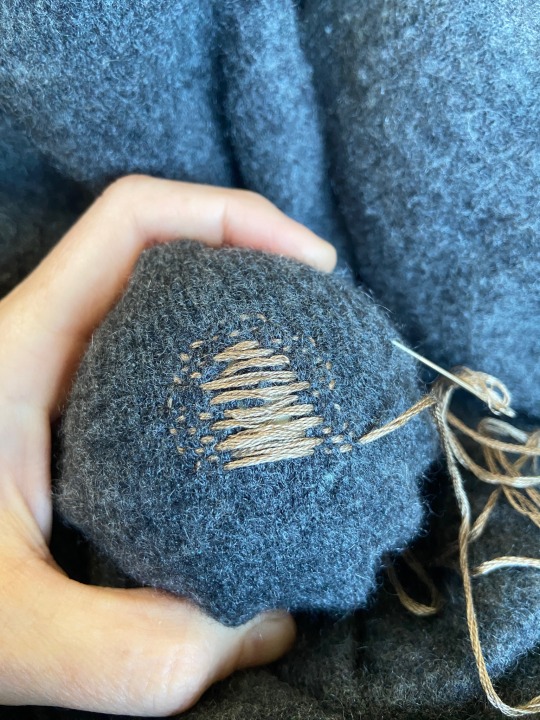
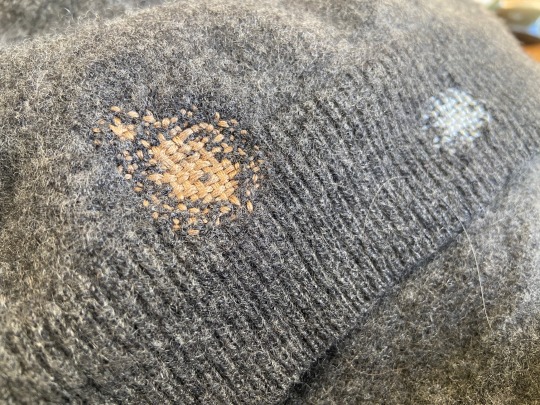
Practicing darning on some cashmere sweaters. It makes me think of fireworks. Little explosions of color.
282 notes
·
View notes
Text
At KEW ENGG. & MFG. PVT. LTD., we understand the critical role of precision in modern manufacturing. We are dedicated to providing a comprehensive range of high-quality Cloth Guiders.
#kewengg#machine#machinemanufacture#manufacturer#cloth guider#textile processing#textiles#textiles industry#machinery
2 notes
·
View notes
Text
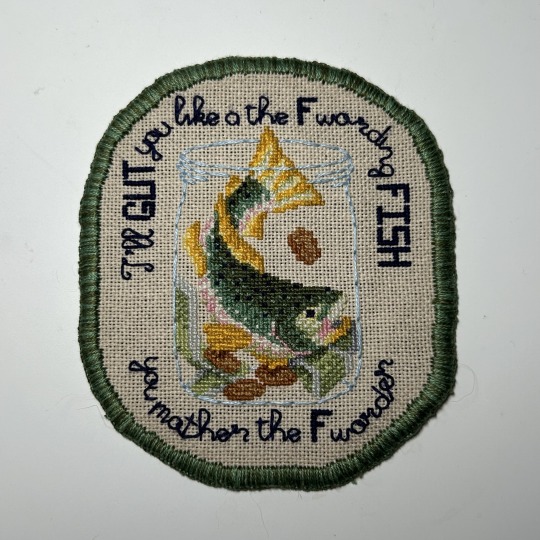
My latest patch! Shoutout to NavyWolf from my twitch chat for stringing words together in a phrase that stuck with me long enough for me to make this out of it!
More chatter and some progress pics under the cut :)
If you are wondering what this is the best explanation I can give is during last February I decided I wanted to do a swear jar thing on stream and during some on stream planning this phrase was said in chat. Somehow it just evoked such a powerful mental image for me that I had to make it something real. And reflecting on that, I feel like a lot of the art I make is over that exact same reason.
With how busy school had been I didn't actually start work on this patch till the end of March, where I dusted off my pixel art skills for the pattern.


^the first sketches
After the pattern was finished up I basically just spent every moment of my free time (and some time I should've used for school work) working on the patch. I don't know why I was in such a rush since my own self imposed deadline could've stretched to basically next February, however my new sweater doesn't have any patches on it so I guess I wanted something for it as soon as I could.
I don't have much else to say about the process, it was fairly straightforward as far as patches go. I did find a nifty little website that includes colour picking with actual DMC or Anchor thread colours. I'll probably be using it from here on out for planning, although knowing me I will still be going back and forth between that and my phone's shitty little pixel art app.
And the progress gif!

Amazingly this one has more individual photos in it than the minecraft patch, but I think that's mostly the text cause I had an idea for how I wanted it to look in this gif once it was all done anyway.
And here it is in it's place of honour, same spot as the minecraft patch on my other sweater if you were curious:

#orange peels#embroidery#textile art#there really is something to be said about how the process changes when it becomes a part of the vision#<- this referring to a few choices I made while working on this patch. Mostly to do with the order of colours#and especially the process of adding the text. Maybe I am just watching too many short form videos about embroidery#anyway as always with these projects it makes me want to make more of them.#I've got some free time now so I'm sure I'll have something else to work on soon
94 notes
·
View notes
Text






Various degrees of Heartwork
#heartwork#embroidery#beadwork#fibre art#hand stitching#bead embroidery#needlework#hand embroidery#beading#arts and crafts#textile art#process pics
13 notes
·
View notes
Text
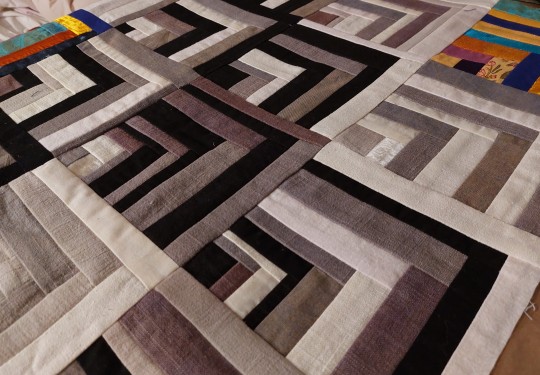
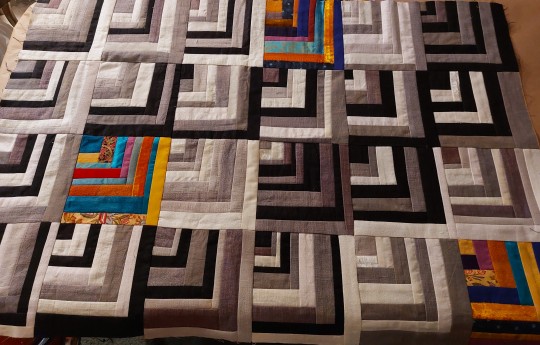
when I was looking for that other piece, I ended up also finding this scrap quilt I put on hold. i think I always wanted to come back to this one but seeing it again really makes me want to finish it soon 👀
179 notes
·
View notes
Text

Construction of the mother-of-pearl trench coat, Loewe SS25 by Jonathan Anderson



#paris fashion week#pfw#ss25#loewe#jonathan anderson#fashion#runway#process video#metiers d'art#savoir faire#mother of pearl#trench coat#pattern#surface pattern#surface pattern design#pattern design#textile design#textiles#natural materials#shell
28 notes
·
View notes
Text
No rules quilting
Incorporating english paper pieced blocks in a largely foundation paper pieced design
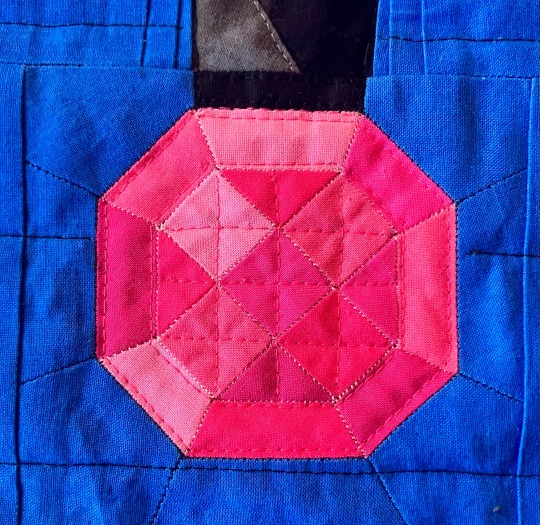
Some shapes are a bad fit for foundation pieced designing. The chunky shapes I wanted for my gems were better accomplished with english paper piecing in 4 of my 7 swords.
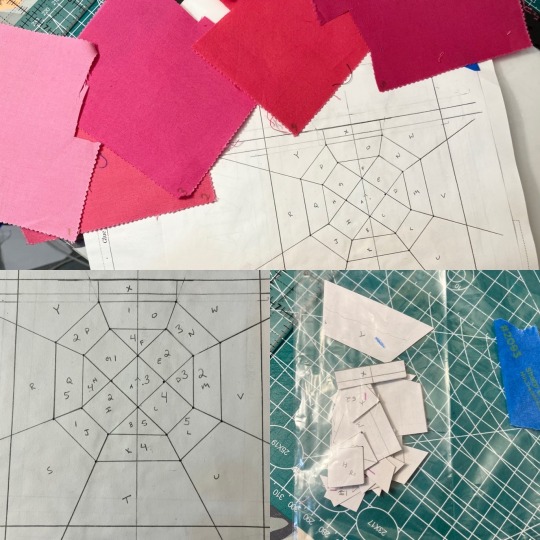
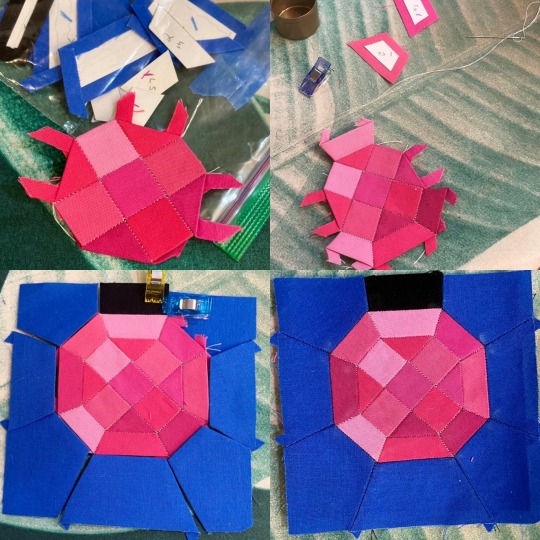
I am not experienced at hand piecing, this was my second try ever. I hope to improve my stitching in the future, I’d like it to be more consistent in size and tension.
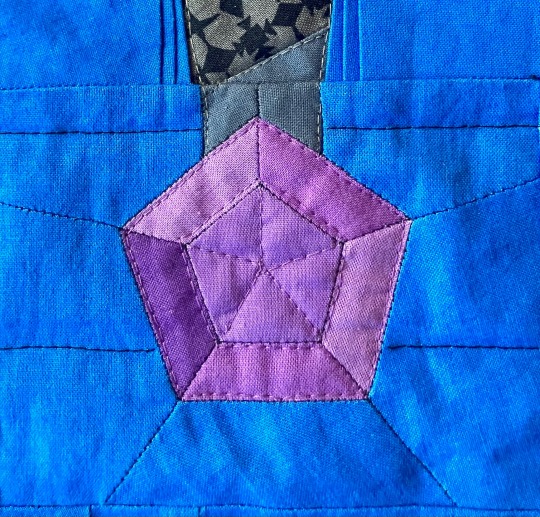
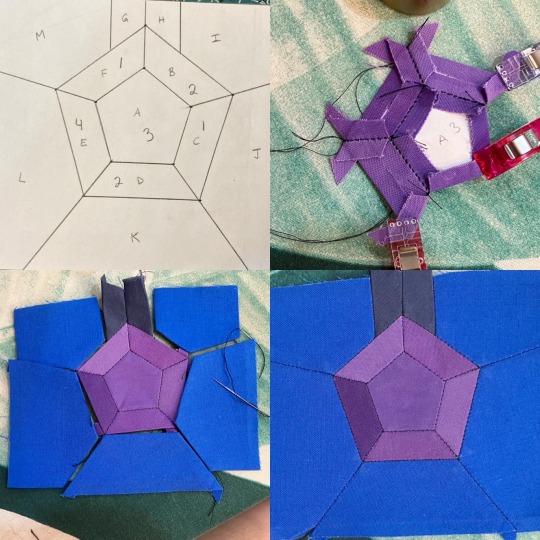
I found it hard to know how much smaller to make the gem patten, to account for the addition of slight bulk at the seams. I finally got it right on the last gem. (Also the easiest since it had the fewest seams to account for.)

FPP shapes only have Y seams where two FPP pattern pieces are being joined. For example, in the green gem the top group of 5 triangles and the bottom group of 3 triangles were separate pattern pieces.

I don’t think mixing techniques for this project distracts from the overall image, and I got the shapes I was looking for much more easily than if I had stuck to only FPP for the entire design.
10/10 will mix techniques again.
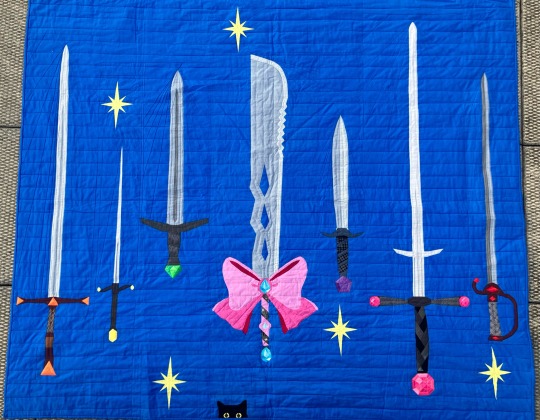
#it’s been fun going through my process photos as I work on my next design#quiltingwitch#quilting#textile art#artists on tumblr#fiber art#english paper piecing#foundation paper piecing#modern quilt#quilt#textile arts#sewing#art#swords#gems
100 notes
·
View notes
Text
The absolute best way to get good at crochet relatively quickly when you're first starting out, in my opinion, is to crochet granny squares. I had a night shift job at a call center where the only thing I could actually do during downtime was crochet and I started out with granny squares and let me tell you... despite the process making me want to spit blood with anger, I was a pro after about 15 of those suckers.
#crochet#yarnblr#textiles#I think around the third or fourth square I was so mad that I decided to keep on making them out of pure spite#it's literally the most frustrating thing ever at first#but it teaches you the basics as well as what different stitches actually look like in the process
12 notes
·
View notes
Text
Got bored and messed around, found out natural henna powder when made into a thin soupy consistency is AMAZING at dying/staining wool!! I assumed it would do *something* because it dyes skin and hair so well, but I didn't expect such a vibrant color so quickly! I don't know how well it'll last or anything since I'm just getting into fiber arts/textile arts, but like look at this color😍 This is JUST raw (washed) wool dipped into the 'liquid' for all of maybe 10 minutes and rinsed, no mordant or anything of the sort. Needless to say I think the experiment is a success lmao

#spinning#spinning wheel#wool#dyeing#dye#henna as dye#dyed wool#hand dyed wool#hand spinning#fiber arts#textile arts#textile work#sca#henna#raw wool#wool processing#dyeing wool#drop spindle#spinning wool#yarn#hand dyed yarn#dying yarn#yarn making#crochet#knitting
10 notes
·
View notes